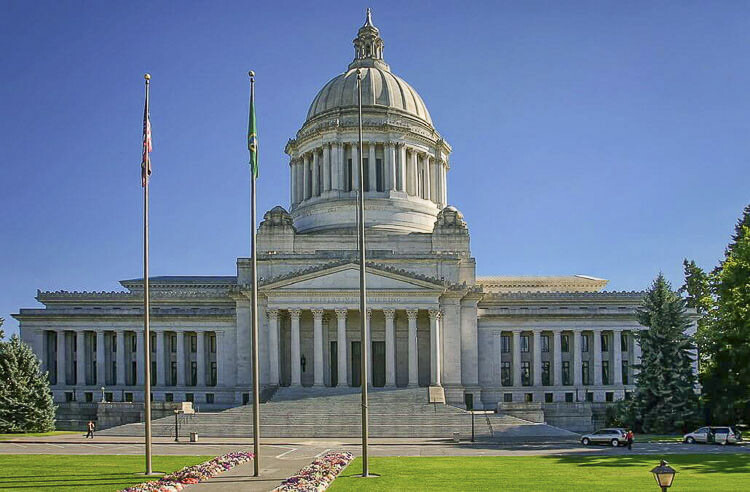
State Rep. Chris Corry offers his assessment of the recently completed session of the Washington State Legislature
Chris Corry
Washington Policy Center
As the incoming new Center for Government Reform Director (I start May 1), I’m excited to get to work to help improve the transparency, accountability and performance of our state government. As a taxpayer and current lawmaker, I’m also happy to celebrate “Sine Die.”

“Sine Die” is Latin for “without day.” It is the term of adjournment ending the Legislative session. This past Sunday the Legislature concluded its business for 2023.
Based on the proposals that didn’t pass it is safe to assume that all Washingtonians should celebrate “Sine Die.”
State Operating Budget
Washington state concluded the 2023 session by passing the largest operating budget in the state’s history at $69,767,010 (They couldn’t have cut $10?). The budget writers have claimed to create a budget while not increasing taxes. And while that is technically true, the growth is driven by the Climate Commitment Act and Capital Gains Excise Tax (Income Tax for our out of state readers), taxes passed in prior sessions that are coming online in 2023. Taxpayers will also be faced with the new long-term care tax for the first time this year. These prior tax increases translate to more expensive goods and services for Washingtonians.
The other area of concern in the budget is the lack of savings in our rainy day fund. During the 2021 session, the fund was emptied under the guise of Covid-19 pandemic and put into an account that wasn’t saddled with restrictions (read, needing bipartisan support to spend). This withdrawal has put Washington state in a potentially disastrous situation if we are impacted by a recession and declining state revenues.
Our Democratic State Treasurer has called on state lawmakers to maintain a minimum 10% budget reserve. Washington state again falls short compared with other states across the country. While the enacted budget shows reserves at 10% at the end of the 2023-25 outlook, that is relying heavily on an ending fund balance that is almost entirely spent in the 2025-27 outlook. And we must remember that this includes spending money previously transferred out of our budget stabilization account.
Tax Proposals Fail
Several last-minute tax proposals died during the session. As previously reported, SB 5770 was introduced to remove the voter-approved property tax growth factor from 1% to 3%. A proposal to increase the Real Estate Excise Tax failed to pass in the final weeks of session.
There seemed to be a disconnect between majority parties in the House and Senate on passing these tax increases. While Senate Democrats said both proposals were dead House Democrats openly disagreed.
It is unclear if it was just timing or politics on why these two bills did not move forward but post-session comments indicate they will be back for a discussion in 2024.
Emergency Powers Remain Unchecked
Lawmaker proposals to reign in emergency powers failed to make it out of committee in 2023. HB 1535 and SB 5063 did not receive a hearing despite bipartisan support.
There was a proviso in the Senate budget to review Washington State’s emergency power but it was cut from the final budget.
As a reminder, Washington state ranks 41st in Emergency Powers Checks & Balances.
Tax Transparency
The public need for clear, accessible tax information is growing by the year. In 2023 there was another bipartisan proposal for tax transparency. SB 5158 would help Washington citizens understand the who, what, where, when and how much around the taxes they paid.
While this bill did not survive the session, a budget proviso did make the final cut! This funding would require the Dept of Revenue to create an implementation plan for the searchable database envisioned under SB 5158.
Now we wait to see if the governor keeps this tax transparency resource or vetoes it (again) like he previously did.
Public Records Transparency
The need for open and transparent government records is an ongoing discussion in Olympia. While Washington state’s Public Records Act provides strong open records access, the number of limitations and restrictions continue to grow. Access can also be a complicated maze across various state agencies.
We previously covered HB 1856 which proposed the creation of The Office of Transparency Ombuds. This bill was introduced late in the legislative session so it did not pass but will be available for discussion in 2024.
As noted in the WPC Policy Guide:
“Currently, when government officials violate the Public Records Act, citizens are forced to file a lawsuit to receive the public records improperly withheld. This means an individual must take on the full force and legal resources of the government agency being sued. To level the playing field, the legislature should authorize an independent, open government ombudsman to be an advocate for citizens.
This independent public records advocate would be able to provide information on public records and open public meetings to state and local agencies and the public, while also representing the public in obtaining public records from state and local agencies.”
A new lawsuit filed this week by the Washington Coalition for Open Government is demonstrating just that. At issue is the claim of “legislative privilege” being used as a reason to withhold documents from public request.
Stay tuned for future updates on the actions the governor takes on the budget in the coming weeks.
Chris Corry is the director of the Center for Government Reform at the Washington Policy Center.
Also read:
- Opinion: In-n-Out Burger is so much more than fast food for so many of usPaul Valencia shares why In-n-Out Burger means more than just fast food for countless fans as Ridgefield nears its grand opening and Vancouver’s location begins construction.
- Opinion: Washington’s June 2025 budget revisions – revenue up spending up moreMark Harmsworth of the Washington Policy Center critiques the state’s latest budget revisions, warning that new taxes—not organic growth—are driving revenue. He calls for fiscal restraint and long-term reform.
- Opinion: Pedestrian control signalsDoug Dahl explains Washington state law regarding crosswalks and pedestrian signals, offering safety insights and common misunderstandings about traffic control at intersection
- Letter: ‘How can five part-time legislators without research support or reliable access to information serve as an effective check on six full-time elected executives’Bob Zak expresses agreement with recent opinions on the Clark County Charter’s imbalance and endorses John Ley’s transit preference while questioning light rail costs and Council effectiveness.
- POLL: Should the Clark County Clerk remain an elected position?Following public opposition, Clark County Council dropped a proposal to make the clerk an appointed role. Readers can now weigh in through this week’s poll on whether the clerk should remain elected.










